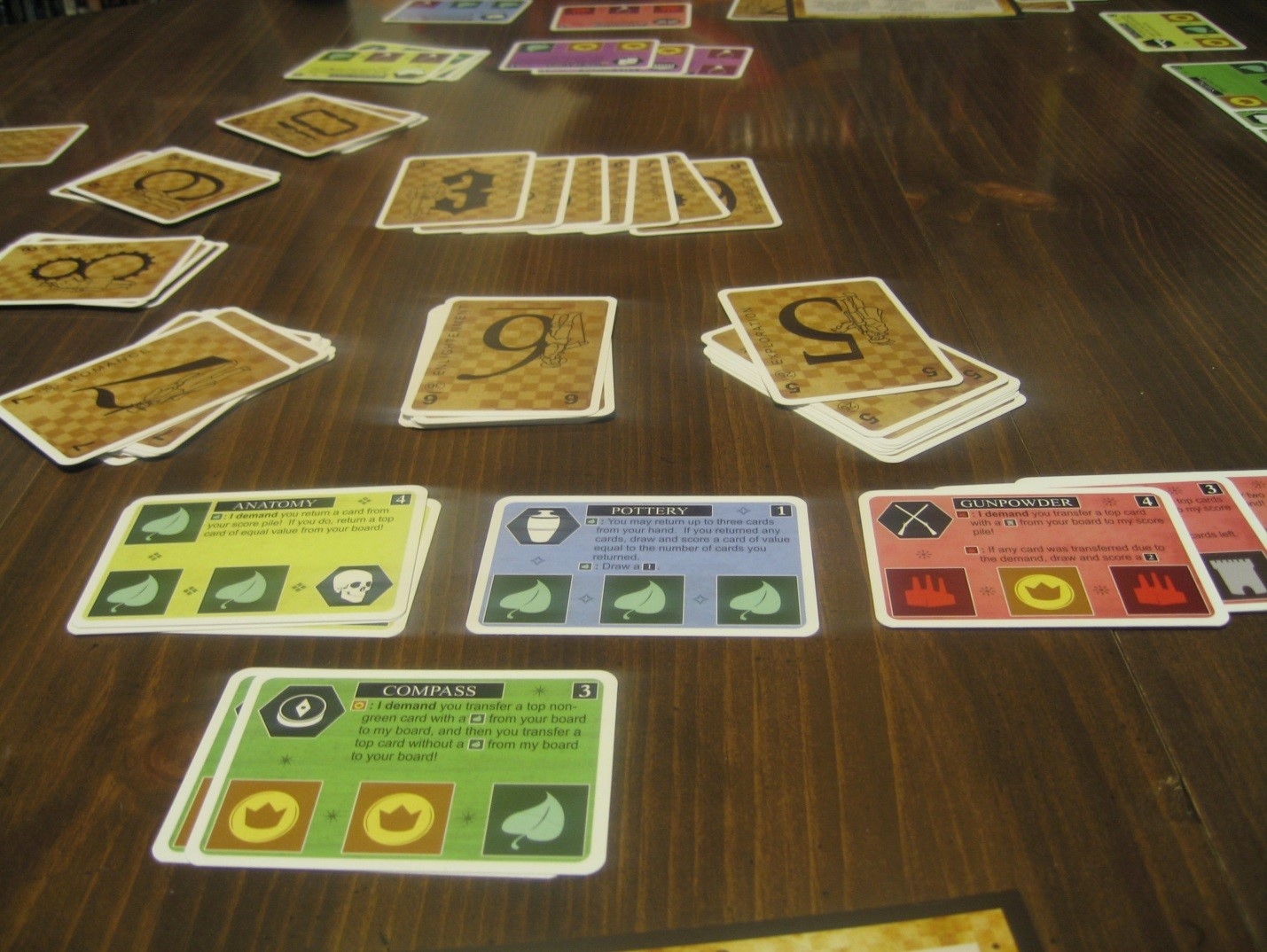Innovation: Deluxe Edition Review
on Nov 17, 2017
Critical Hits: Singular, minimalist take on the civilization building concept; unusual mix of traditional cardplay elements, take that, and deep strategy; all-in-one package with tremendous replay value
Critical Misses: Graphic design is miserable; some awkward and difficult to teach concepts
I first played Innovation some seven or eight years ago, and I found it to be a stunning piece of design. With just a stack of 150 or so cards - all completely unique in the deck - this game cleverly illustrated a grand, epoch-spanning theme. As the title suggests, it's all about innovations, and how these ideas disrupt and imbalance the flow of history among civilizations competing for prosperity and growth. But it did all of this without the usual trappings of a 4x game. There is no map, no physical geography, no units, no resources and no economy. The only components are this massive deck of brutally overpowered, rule-breaking cards that force other players to do things or give you an unfair advantage.

Well, it looks better than the 1st edition of Glory to Rome...at least.
Designed by Carl Chudyk, the mad genius also responsible for the sorely missed Glory to Rome, Innovation is just as weird, wild and initially inscrutable as fans of his work expect. But unlike Glory to Rome, which was a sort of extension of concepts in San Juan and Race for the Galaxy, Innovation is a much more minimalist, reductive and editorial design. It is, functionally, a tableau builder. But the things you do are different than you might expect and unlike most games of that character, this is a hugely interactive and volatile affair with some nasty take-that play. Some might chafe at that, but I love it.
The basic game kicks off by sorting that big deck into ten stacks of cards, each corresponding to an age of history. You pull one card out to use as a generic achievement (sort of this game's answer to monuments), and everyone takes two cards from the first age. You keep one and the other forms the basis of your civilization, played in front of you face-up. Each card is oriented horizontally, and on it are the conceptual innovation it represents and a few symbols. Each also has what is called a Dogma effect, which is where all the rule-breaking and nastiness come from.
On your turn, you get two actions. There is a basic draw- you pull a card from the earliest age that still has cards remaining unless a Dogma action lets you skip ahead, a powerful ability throughout the game. You can also "meld" a card, which Rummy players will recognize as simply playing a card to a set. If you already have a card of that color, it covers it and replaces the Dogma effect and all of the symbols. So you have to decide if you want to keep an existing Dogma or a new one. But here is where it starts to get interesting- some abilities allow you to "splay". Don't panic. All that this means is that you take one of your color stacks and shift every card under it in any of the four cardinal directions. What this does is reveal symbols on previously played cards in your stack- your past innovations impact the future.

Probably better to illustrate that last paragraph...
Now, these symbols impact Dogma actions. In order to take a Dogma action, you must have the most symbols that it requires on the table. So that splaying action can give you a big edge in getting your Dogmas played as you can exponentially increase the symbols you have if you strategize properly and get the right cards. But there is a catch to Dogmas. If another player has as many symbols as you do, they get to SHARE the action. Everyone else is vulnerable, which means that you might be demanding them to give you cards to score, return played cards back to the stacks, exchanging cards, or any number of other detrimental effects. So there is something of a majority mechanic at work here, and you often must decide whether it is worth a Dogma action if the result is that one or more other players will get to splay, score, or draw cards ahead of the age schedule. But you also get a small kickback- if a Dogma is shared, you get to draw a card.
All of this is scored up by cards in a score pile as well as achievements earned for accomplishing certain short-term objectives. You can expect this all to take about 45-60 minutes, and it plays best with three or four due to the majority and Dogma sharing element but with two it is perfectly playable and still very enjoyable. It is definitely the kind of game that rewards repeated play as there is almost a Cosmic Encounter-like variability and volatility to it along with the potential for quite deep strategy. I would easily regard Innovation as one of the top card games that I have ever played, and it is definitely the Carl Chudyk game I would most likely recommend to newcomers even though it has some slightly squirrely, unintuitive elements.
Now, this review is specific to the just-released Innovation Deluxe set. You can tell it is deluxe by two key features. One is that the glossy black box is embossed with solid gold lettering and detail. The other is that this set includes all four of the game's expansions along with the most recent edition of the base game and a new rulebook with a handy teaching guide. It is definitely the way to buy Innovation today, but that comes with a caveat for new players explicitly mentioned in that teaching guide. Teaching Innovation to people while playing with expansions is "a recipe for people that don't like Innovation, and that don't like you!"
None of the expansions are necessarily more complex and they don't really extend the game's length. But they do increase the number of options available tremendously, and I would regard them more specifically as advanced modules more than expansions. Mostly, they embellish the core action I don't think you would want to play with all of them at once, if only because that would mean having- get this- 50 stacks of cards on the table.
Cities of Destiny is the simplest expansion and probably my favorite. This adds city cards, which are available and played just like the regular innovation ones but there are bonuses you can earn from melding them- including splays, draws, and even achievement points. This set also adds an Endorse action, which lets you double a Dogma action if you have a city with a matching symbol. These cards are also drawn differently- you can draw a city when meld a card of a new color to your display or splay.
Artifacts of History adds such historical treasures as the Magnavox Odyssey and act as kind of a possible bonus if you meld a card of lower value onto a higher one. This "dig event" puts an artifact on display. The displayed artifact can be used as a one-shot Dogma action and then returned to its stack or you can meld it. This is a cool set as well, and I especially like having an extra Dogma action in my display that I can use even if I don't want the card in my piles.
Echoes of the Past adds innovation cards that have an "echo" effect. These are triggered as a knock-on effect when a Dogma action is taken. However, these appear in the symbol slots. This means that when a stack is splayed, you may reveal an echo. So later on, a past innovation may "echo" with your current dogma. This is neat, but this is also where the additional complexity really starts to come into play. This set also adds the ability to add cards to a "forecast", effectively storing them for later use (which the game calls "promoting").
Figures in the Sand adds people, ranging from Hammurabi (whatever Dogma action effects you effects the other player) and Shigeru Miyamoto. I was also particularly pleased to see that if you meld the card Enterprise with Gene Rodenberry, you instantly win. No kidding. This is probably the most complex addition to the game, adding Karma (sort of "always on" powers) and two new actions, Decree and Inspire. Decrees are special achievements you can claim by having three different figures in your hand (not displayed, mind). You discard them and claim the card for it and get a special action. Inspire is a special action that gives you a bonus for drawing. Then there is also Fading to consider- you can only have one figure as a top card in your display, sort of your nominal leader. When a figure fades, it goes into score.

It's more Innovation than you can handle...at first.
I like all of the expansions, but once again I'd mainly recommend them for advanced players who are very familiar with the base game. With such players, throwing an expansion set into the mix can make for a compelling game with tons of new possibilities. This game is all about finding those secret pathways, the killer combinations, and meeting the elusive instant-win conditions some cards offer. These are definitely more of a good thing, but be patient if you are new to Innovation and aspire to add them when you get good at.

 Customer Support
Customer Support  Subscribe
Subscribe 




 Account
Account  Wishlist
Wishlist 

